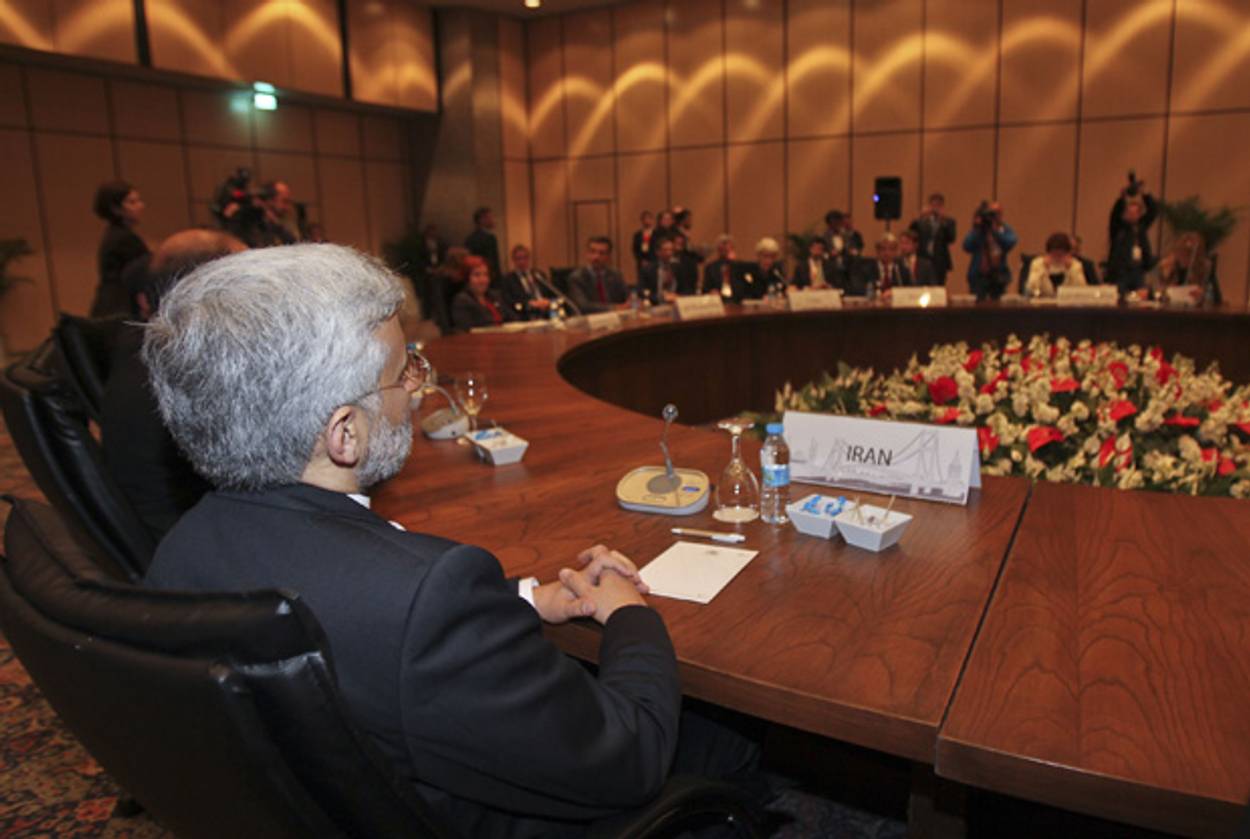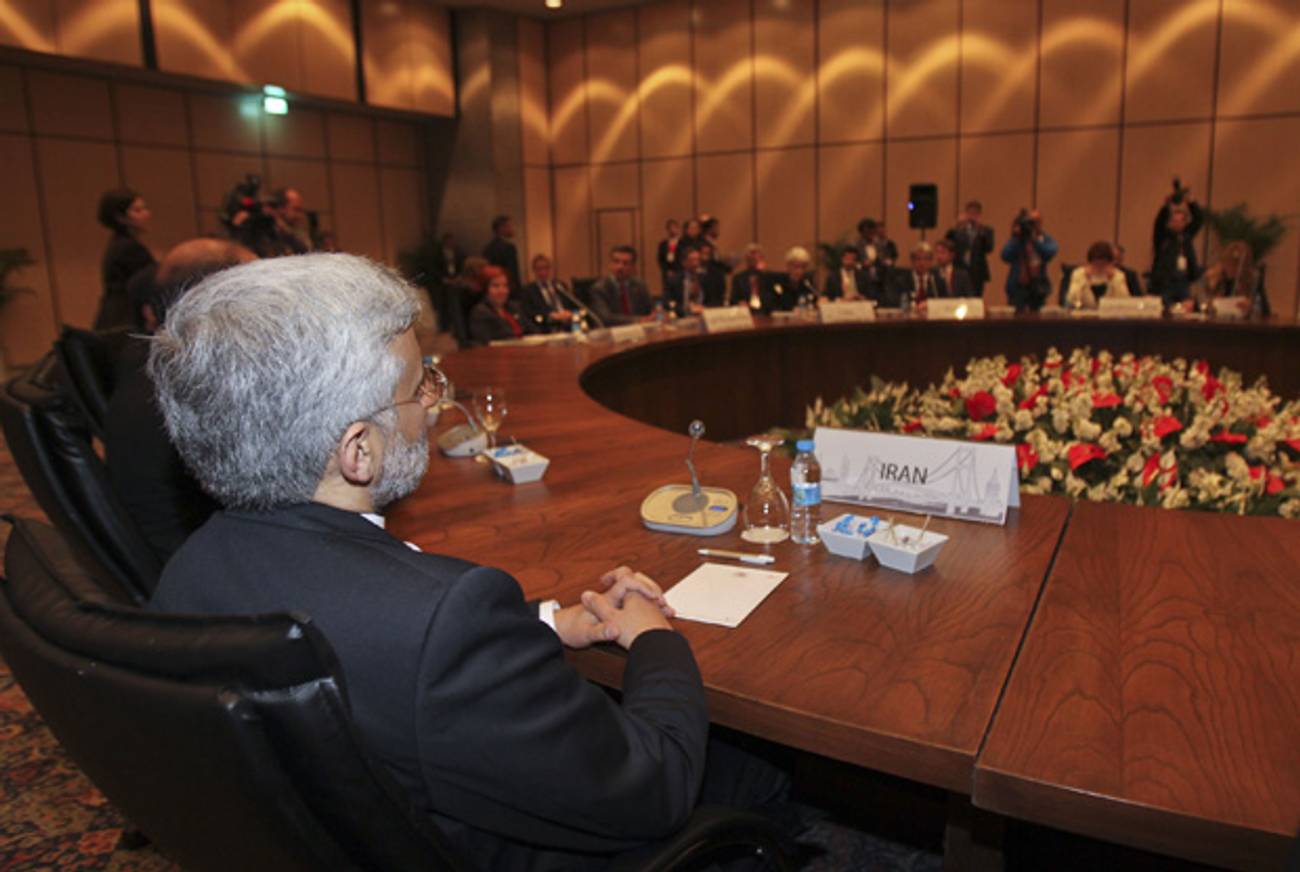On Iran, Deal or No Deal? Israel May Prefer No
Fear: agreement could cause military nuclear program to go overlooked




The leak yesterday of a sketch of a device used for nuclear bomb work that, according to a “country tracking Iran’s nuclear program,” can be found at Iran’s Parchin facility has lent new urgency to the P5+1 talks scheduled for Baghdad next week. It’s also driven a new narrative: that, for Israel, a resolution stemming from those negotiations would actually be a bad thing.
The logic goes like this: the P5+1 negotiations are focused primarily on uranium enrichment and are overlooking the explicitly (and allegedly) military dimensions of Iran’s nuclear program, which appear to be proved by such things as yesterday’s leak. U.S. expert Anthony Cordesman’s new report has received much attention in Israel. “The threat Iran’s nuclear efforts pose are not simply a matter of its present ability to enrich uranium to 20 percent U-235,” Cordesman argues, “and efforts to control its enrichment activities will not halt its ability to move forward in many areas even if its current enrichment facilities and stocks of highly enriched uranium are fully secured.” (David Albright said much the same in The Scroll last Friday: “If Iran showed in a verifiable way that it wasn’t going to build nuclear weapons,” he noted, “people wouldn’t care so much about centrifuges.”) Cordesman also convincingly lays out the case, based on prior international inspectors’ reports, that the program includes a military component.
Under Israeli thinking, a P5+1 deal on enrichment is a dialectical step backward, because it will reward Tehran and create international complacence, which will in turn weaken the sanctions that have so far effectively slowed Iran. As Defense Minister Barak put it, “If the demands are expressed in the minimalistic manner which we suspect, Iran could agree to all of them, and still be able to continue progressing toward a nuclear weapon.” A senior Israeli official, who for all we know is also Barak, added, “Israel’s main concern is if the talks lead to the stop of Iran’s nuclear program, or create a platform that buys Iran time, while eroding sanctions.” He concluded: “The recent positive statements made by Iran are meant to create an impression of moderation and bolster relations with the world powers, but there is no real fundamental change in Tehran.”
So, what are the plausible alternatives? Here are two different models. Patrick Clawson argues that the sanctions-negotiations balancing act needs to be accompanied by greater support for pro-democracy groups in Iran that may eventually lead to a new regime. “A democratic Iran would likely drop state support for terrorism and end its interference in the internal affairs of Arab countries such as Iraq and Lebanon, improving stability in the Middle East,” Clawson argues. “And although Iran’s strongly nationalist democrats are proud of the country’s nuclear progress, their priority is to rejoin the community of nations, so they will likely agree to peaceful nuclearization in exchange for an end to their country’s isolation.” On the other hand, Mehdi Khalaji proposes something of an opposite route, in which the United States goes out of its way to insist that it is not even thinking of regime change in order to give Ayatollah Khamanei the peace of mind—and the domestic victory—that will allow him to compromise.
Reports such as this one that Iran is getting what it wants could be designed to open such political space. But it also could worry Israel.
Meanwhile, though, columnist David Ignatius may be an uncharacteristic step behind in lauding the potential for a deal on enrichment. The potential is certainly there, but it may not be enough. If he is reflecting U.S. thinking, then the administration had better wake up to the concerns of Israel’s government, which is newly strengthened but still evidently as worried as ever.
Drawing Shows Iran Has Chamber Used for Nuke Arms Work [AP/Vos Iz Neias?]
Israel Fears Nuclear Deal Between Iran, World Powers as Baghdad Talks Draw Near [Haaretz]
A Compelling Plan for Iranian Talks [WP]
Sanctions Are Only a Stop-Gap [Foreign Affairs]
The Ayatollah Contemplates Compromise [The Washington Institute for Middle East Policy]
Earlier: Cleansing Suggests Iranian Military Program
Marc Tracy is a staff writer at The New Republic, and was previously a staff writer at Tablet. He tweets @marcatracy.